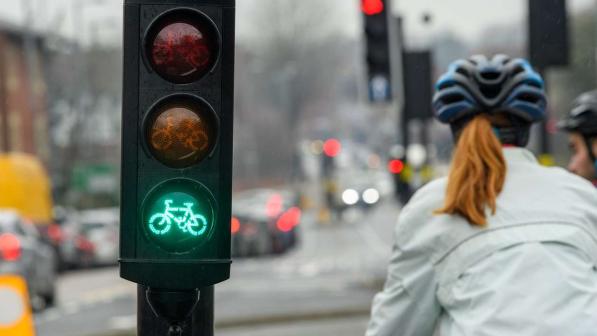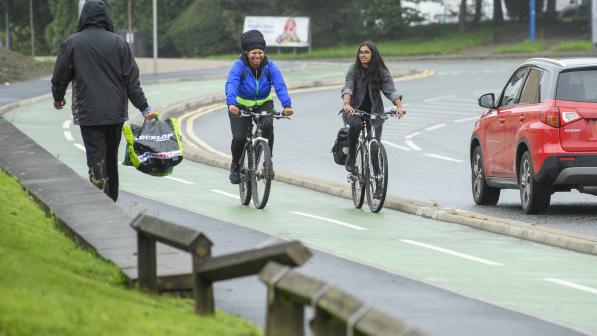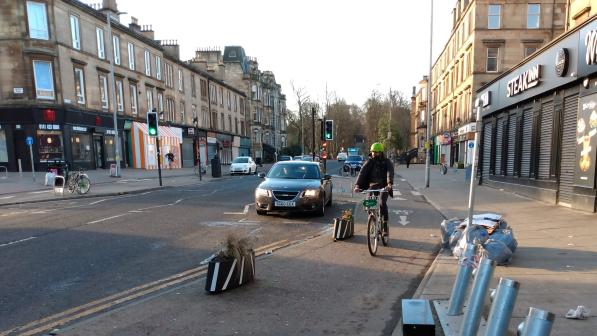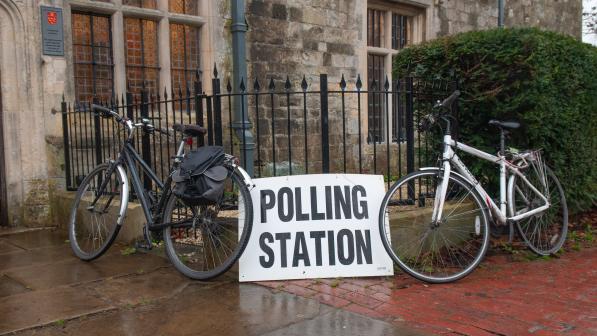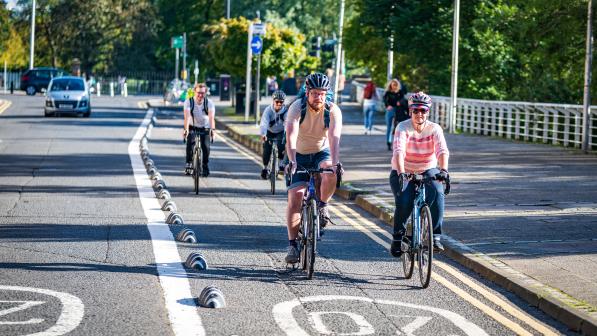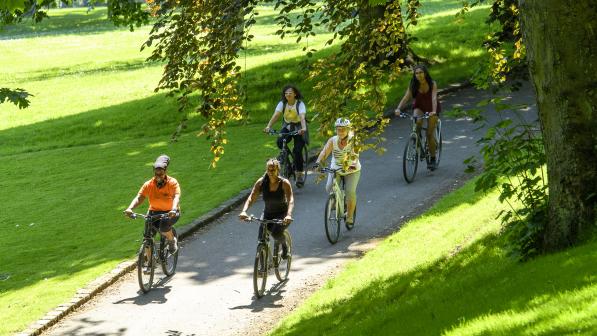Elections 2022: FAQs

Getting there with cycling - make it happen
Across our election campaigns, we are setting out a vision for cycling, with safe urban spaces, connected communities, and accessible countryside; a vision where everyday journeys are active travel journeys, our air is cleaner, and our health and wellbeing prioritised.
Our reality is different: congested streets, designed for cars and not people, deter most people from cycling and under two per cent of all trips are made by bike.
It is time for politicians to step up, be bold, carefully plan and speedily deliver the cycle lanes and safe cycling infrastructure we all need.
- Where are elections taking place in May?
- Is cycling relevant in elections?
- What is Cycling UK asking for?
- Why are our manifestos in each nation different?
- How can you support our election campaigns?
- What happens if I sign the petition?
- Are we targeting candidates in our campaigns?
- I’ve signed the petition, what else can I do?
- What is the Cycle Advocacy Network?
- Are we creating tools or guides to help people who want to campaign around the elections?
- What if my campaign group wants to ask for something else?
- Who has responsibility for highways, roads and for building cycling infrastructure?
- Highways responsibility in English Councils?
- What if I live in London?
1. Where are elections taking place in May?
On 5 May, there are national elections in Northern Ireland (NI) to the NI Assembly, council elections in every local authority in Scotland and Wales, and elections in some, but not every local authority in England.
2. Is cycling relevant in elections?
We need to make it relevant, and campaigning can make a difference.
Our manifesto for the Scottish Parliament election last year included an ask to spend at least 10% of the transport budget on active travel. The SNP pledged to do this, and the Scottish Government has since committed to reach this target by the end of this parliament.
That followed persistent campaigning by Cycling UK and others such as Pedal on Parliament and Walk, Wheel, Cycle, Vote, and shows that you can make a difference through campaigning.
For this year’s NI election, our manifesto calls for an increase in the active travel budget each year, to match the Scottish Government’s 10% commitment within the Assembly’s next four-year term.
3. What is Cycling UK asking for?
We have published different manifestos (see issuu doc within each nation’s election page) for the NI Assembly election, and for the local authority elections in Scotland, Wales and parts of England.
Each manifesto sets out what we’re asking candidates to commit to, which is different in each nation, although there’s a common ask around the delivery of connected networks of high quality cycling and walking routes, and a universal theme around the need for action, that it’s time for politicians to deliver those networks.
It’s time for them to get there with cycling – to make it happen.
4. Why are our manifestos in each nation different?
Transport is largely a devolved matter, and the devolved governments in Scotland, Wales and NI, not Westminster, are largely responsible for active travel policy within each nation, the priority it’s given, and how much funding is committed nationally,
So, Wales already has an Active Travel Act, which requires local authorities to do various things, including promoting active travel and taking steps to enhance provision for walking and cycling.
Also, the Scottish Government has already committed to levels of funding for active travel that aren’t currently available to councils in England.
This means that local authorities in Scotland, England and Wales are operating within different legal, funding and policy frameworks, and our manifestos have to reflect that.
5. How can you support our election campaigns?
We have separate campaigns in each nation, with different manifestos although, as outlined in answer 3, there are common themes.
If you live in Scotland, Wales or NI, or anywhere in England where there’s an election for a council that has highways responsibility (see question 12 for further explanation), you can sign our nation-specific petitions to support our manifesto for cycling.
It takes two minutes to do this through our online actions supporting our:
- Northern Ireland Assembly manifesto
- Wales local authority manifesto
- Scotland local authority manifesto
- England local authority manifesto
6. What happens if I sign the petition?
Last year, over 3,000 people signed our petition for the Scottish Parliament election, and we were able to take that to the political parties in Scotland, which helped secure commitments to our manifesto asks.
In the run-up to elections in May, we’ll be letting sitting politicians, candidates (when we know who they are), and political parties know that people support action to deliver on our cycling manifestos.
But they all need to hear that this is what people want, because the numbers do matter, so please sign up and share the petition widely with people you know. Our online actions include social media share buttons and suggested tweets and posts.
7. Are we targeting candidates in our campaigns?
Yes. Initially, we’re asking people to use our online actions to sign our manifesto petitions, which will enable us to let political parties and politicians know what we’re asking for, and that it’s popular!
Later, we’ll create an online action people can use to contact their candidates, but we won’t know who the candidates are in all of the elections until early to mid-April, and it’s never easy to get a complete and accurate database list of all the candidates in the local elections.
That’s why we’re starting with petitions, showing the public support for our manifesto asks.
In April we’ll be switching our focus to individual candidates, asking whether they’ll deliver for cycling and make it happen.
8. I’ve signed the petition, what else can I do?
Our online actions are designed to make it really easy for people to support our manifestos and later to email their candidates. If that’s all you have time to do, that’s still fantastic.
But we also want to help people get more involved in cycle campaigning locally.
You can choose how much time you commit to this. It doesn’t have to be a big commitment, but if you’re not already involved in your local cycling campaign group, this is a great time to change that – many groups will be actively campaigning around the elections.
You can find Cycling UK affiliated cycling campaign groups, and there are other groups out there too – just search the following online: “[name of your nearest town, city] cycling campaign”.
If you want to get more involved locally, consider joining our Cycle Advocacy Network (CAN).
9. What is the Cycle Advocacy Network?
The Cycle Advocacy Network (CAN) brings together people with a shared interest in creating the conditions that enable more people to cycle, including better infrastructure for cycling and safer roads.
CAN resources, events and tools are open to all, and the specific ways to get involved are listed below.
If you'd like more detail, please read the Introduction to the Cycle Advocacy Network - and join us on the journey to get more people cycling.
10. Are we creating tools or guides to help people who want to campaign around the elections?
Yes.
On the CAN webpage there are already links to various resources and guides in our toolkit for campaigners. These include guides on:
- How to set up and plan a new campaign
- How to meet effectively with your local representative
- Writing a letter to your local paper
- Media advice for local campaigners
We’ll be adding to these guides and toolkits in the run-up to May’s elections, with guides coming shortly on taking your local candidates for a cycle ride, creating an advocacy plan to influence decision makers, and how to run an election hustings event.
All of these will be published on the CAN resource page.
11. What if my campaign group wants to ask for something else?
That’s not a problem.
The precise actions needed to make cycling and walking natural choices for short journeys will vary in different towns, cities and rural communities.
Our manifestos, particularly for the local elections, focus on prioritising and delivering connected networks of cycling and walking routes to high standards, and for action and urgency.
But local campaigners and groups may well want to ask candidates to commit to deliver a particular scheme, do something else, or resolve a specific barrier to cycling.
Our manifestos are designed so that: those without the time or desire to become more involved in local campaigning can show their support for some general asks and commitments; we can show local politicians that there is wider public support, beyond the actively engaged campaigners and groups; and to provide some general headline asks which will hopefully be helpful for existing campaigners and groups.
If you’re actively involved in local campaigning with specific local asks, our manifestos are designed to add wider support, but not replace what you’re doing.
12. Who has responsibility for highways, roads and for building cycling infrastructure?
A complex question, with exceptions, but in Scotland and Wales every council has elections in May, and all of them have highways responsibility.
So, our online manifesto action in Scotland and Wales applies throughout, because everyone eligible to vote can ask their candidates about matters those candidates are responsible for – the things in our manifestos.
In NI things are different, as it’s the only part of the UK where highways responsibility doesn’t sit with a council, but with the government, in this case the Department for Infrastructure. That’s why the elections in NI are crucially important for active travel, because national policy and what would elsewhere be considered local delivery all sit with those elected to the Assembly in May.
And in England – well it’s complex, as explained in answer 13.
13. Highways responsibility in English Councils?
Local government in England is complex, because 30 areas have a ‘two tier’ system, where the ‘upper tier’ County Council has responsibility for certain activities including highways.
Those upper tier authorities are responsible for transport, including investment in it, whilst the ‘lower tier’ district or borough council has responsibility for matters including planning, but not transport.
The remaining 128 local authorities are single tier, so they control everything except parish council decisions.
While planning and other decisions by lower tier authorities can have some influence on active travel policy and provision, it’s the upper tier highway authority which controls the transport budget. Consequently, Cycling UK’s local authority election campaign in England is focussed on local authorities with highways responsibility.
If you live in England, you’ll therefore only be able to sign our petition if you live within a council area where the council has an election and it has highways responsibility, so not a second tier council in a County Council.
However, if you’re a cycle campaigner in a lower tier council with elections, you can of course still use our manifesto, tools and guides on the CAN resources page to help with your own local campaigning.
14. What if I live in London?
We’re not campaigning in London for these elections, where all the boroughs have elections in May, and all of them have highways responsibility.
That’s because our friends at London Cycling Campaign are planning what we know will be a fantastic London election campaign.
If you live in London, our England online action will redirect you to LCC’s campaign page, where their campaign action will be live in March.
